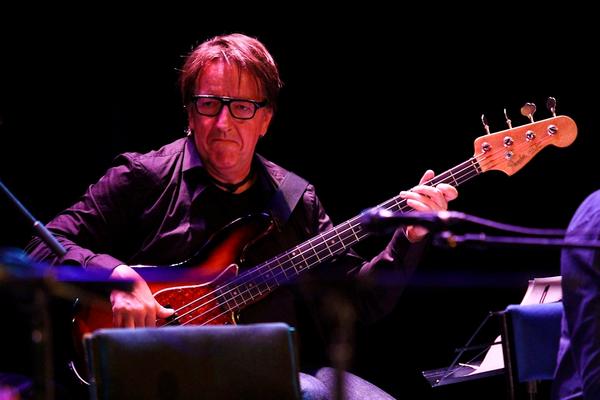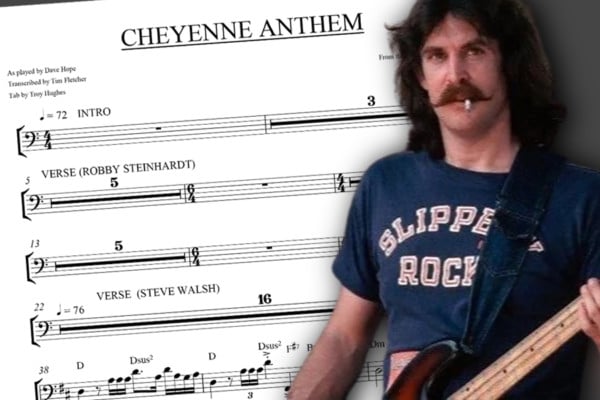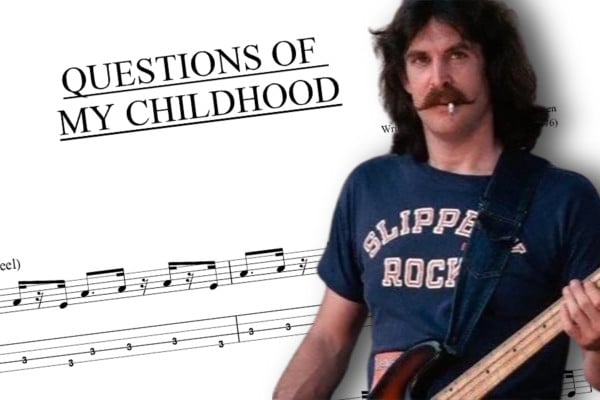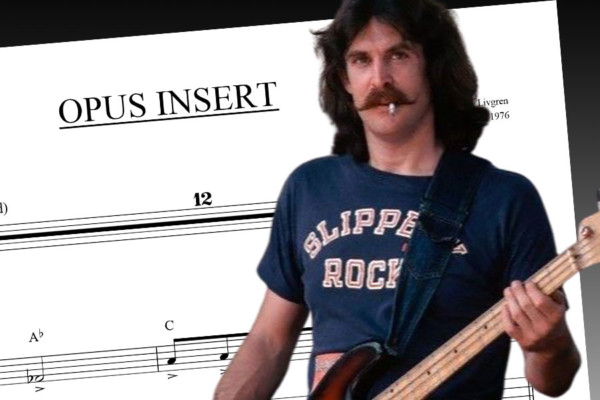Bass Transcription: Ewan Vernal’s Bass Line on “The Wildness” by Deacon Blue

Ewen Vernal was born in 1964 into a musical family in Glasgow, Scotland. His mother was a vocalist, and his father played saxophone and also led a local choir. Ewen’s early musical experiences focused on playing the piano and singing, but this changed during his teenage years after he found an old acoustic guitar in his loft. Although only the two lowest strings remained, Ewen attempted to replicate the basslines of the punk songs he was listening to at the time. By the age of sixteen, he had acquired a bass guitar, and he soon began to play in a range of local bands.
In 1984 he was asked to play on Scottish songwriter Ricky Ross’ solo album So Long Ago, and in 1986 he was invited to join Deacon Blue, a band put together to showcase Ross’ material. The band was successful in the UK market with twelve Top-40 singles, two number one albums, and numerous tours around the world. In 1994, after their fourth album Whatever You Say, Say Nothing (1993), the band chose to part ways. Vernal took this opportunity to develop his session career and to play live shows with a range of artists, including Lou Reed, Michael Brecker, Chris Rea, Fish, Mark Knopfler, Martin Taylor, and classical violinist Nicola Benedetti. During this period, Vernal also joined the Scottish Folk-Rock band Capercaillie and continues to work with them today. In 1999, Deacon Blue chose to reform after a one-off reunion gig, and Vernal played on their new albums Walking Back Home (1999) and Homesick (2001). However, Vernal chose not to continue with the band after this point, continuing with his session work, and his commitments to Capercaillie.
“The Wildness”
This track is taken from the band’s third studio album Fellow Hoodlums, which was released in 1991 and reached the number two position in the UK album charts. This recording revealed a more sophisticated and varied stylistic approach than the more mainstream pop/rock of previous albums and included influences from West African, folk, soul and country music. Vernal is featured prominently on this album, with his inventive and complex lines helping to give both support and drive to the songs. His more melodic approach is heard on several tracks: “The Wildness”, “Your Swaying Arms” and “A Brighter Star Than You Will Shine One Day”.
The bass line for “The Wildness” begins with a fluid high-range melody (mainly in the 13th position) that weaves around the harmony using both chord tones and extensions, and some wider intervals (sixths and octaves). The first verse begins simply with a root-fifth movement but gradually becomes more complex, adding slides between the notes and bar-ending ideas that use chord tones (bar 15) and chromatic movements (bar 18). After a short restatement of the initial melody, verse two begins simply once again but develops the bass line by using more complexity in the early parts of bars 27 & 29.
When the chorus is reached at bar 37, the bass line is rhythmically more sophisticated, with more use of semiquavers. Vernal also uses dead notes and chromatic runs in a tasteful and subtle way, and a four-bar re-cap of the intro melody is ended with a semiquaver flourish in bar 47. Verse three is again quite simple, but with a few added runs; at bar 58 there is a lovely use of root, fifth, octave and ninth, and bar 59 features a low-range scalar run. At the end of the verse in bar 61, Vernal introduces a bar-end motif that he replicates through much of the rest of the song (bars 65, 99, 103, 107) and this helps to drive the song along as it intensifies. The second chorus begins at bar 62, and Vernal develops the earlier idea by introducing octave leaps and uses the B string more than the previous choruses. In the middle section in bars 70-93, Vernal uses a simple pedal E idea, with long fretted and open notes, but builds the movement by alternating these in bars 90-93.
A return of the pre-chorus (94-99) allows Vernal to once again blend mid-neck fills with lower pitch runs (97), and he brings the previous phrase-end melodic idea back at bar 99. The final chorus is again more intense, and in the outro, Vernal combines effectively with drummer Dougie Vipond to emphasize the strong rhythmic pattern at bars 110, 114 and 118.
As a bassist, Vernal has a very strong rhythmic and melodic sense, and some of his playing can be quite complex, but he considers his role in more basic terms; “The main function for me as a bass player is to make a bigger picture, something that works”. At the start of his time with Deacon Blue, Vernal played Fender Jazz basses, but over the course of his career, he has also used Music Man, Warwick, Ken Smith and Sadowsky electrics and Clevinger upright basses.
Download the transcription and follow along with the track:
* I’d like to say a big “thank you” to the members of the Bass Hang for the suggestions – it’s been very interesting listening to such a wide range of music. It’s also been very educational to research the information about each bassist, and in some cases interviewing the musicians themselves. The series could have gone on indefinitely, as there were many other candidates suggested, so I’m sorry if your favorite bassist was not included. Maybe I’ll do another series next year! As the author of this series, I get to be a little indulgent, so this is my own personal choice!


